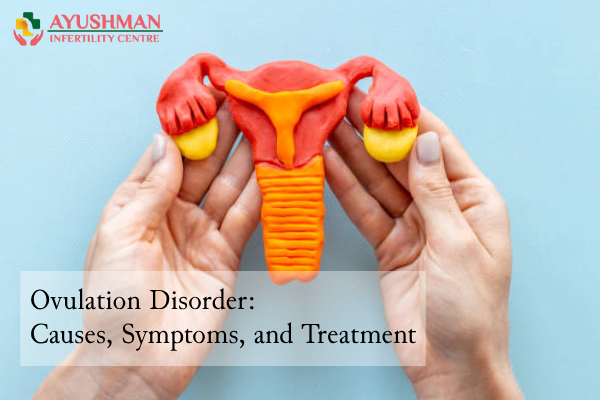
Ovulation Disorder: Causes, Symptoms, and Treatment
Overview
Ovulation is the stage in which an egg is released from the ovaries, a key step in the journey towards conception. When this process is disrupted, it can lead to symptoms of ovulation disorders, making it harder to conceive.
Causes of Ovulation Disorders
The causes of ovulation disorder are:
- Hormonal imbalances: It can significantly impact the ovulation process, as hormones like luteinizing hormone (LH), follicle-stimulating hormone (FSH), and progesterone play key roles in regulating the release of eggs. When these hormones are out of sync, it can interfere with the normal ovulation cycle.
- Polycystic Ovary Syndrome: (PCOS) is a condition where the ovaries become enlarged and contain numerous small cysts. It often leads to irregular or absent ovulation and is influenced by factors such as elevated androgen levels, insulin resistance, and obesity.
- Thyroid Disorders: Hyperthyroidism and hypothyroidism, the two extremes of thyroid function, can both affect ovulation and the hormones involved in regulating it.
- Excessive Exercise & Weight Loss: Intense exercise and sudden weight loss can throw off your hormonal balance, resulting in issues with ovulation.
Symptoms of Ovulation Disorders
The symptoms of ovulation disorder include:
- Irregular Menstrual Cycle: Ovulation disorders commonly manifest as irregular menstrual cycles or even a complete absence of periods.
- Changes in Menstrual Flow: Ovulation disorders can cause menstrual bleeding to become erratic, varying between heavy and light flow.
- Pelvic Pain: Pelvic discomfort or persistent pain often accompanies ovulation, becoming a notable feature of the experience.
- Increased Body Hair: Conditions such as PCOS can lead to hirsutism, a cosmetic issue characterized by excessive body hair growth.
- Skin Issues: Ovulation disorders can manifest as skin issues, such as acne, due to hormonal imbalances.
Diagnosing Ovulation Disorders
Healthcare professionals utilize a range of diagnostic tools and strategies to assess and address ovulation disorders, including:
- Medical History and Physical Examination: Providers start by compiling a thorough medical history, exploring menstrual patterns, lifestyle factors, and any underlying health conditions.
- Hormone Testing and Blood Analysis: Blood tests are essential for diagnosing hormonal imbalances. They measure levels of hormones such as LH (luteinizing hormone), FSH (follicle-stimulating hormone), progesterone, and thyroid hormones to pinpoint issues.
- Ovulation Tracking: Several techniques can be employed to monitor ovulation, such as tracking basal body temperature, noting changes in cervical mucus, and using ovulation predictor kits. These methods help in identifying ovulation patterns and timing.
- Pelvic Ultrasound: A transvaginal ultrasound provides detailed images of the ovaries, helping to detect conditions like polycystic ovary syndrome (PCOS) or other structural abnormalities affecting ovulation.
- Endometrial Biopsy: This procedure involves taking a small sample of the uterine lining to examine how hormonal fluctuations affect the endometrium, offering insights into the impact of ovulation issues.
- Laparoscopy: In certain cases, a laparoscopic procedure allows for direct visualization of the ovaries and pelvic area, helping to identify conditions such as endometriosis or ovarian cysts that may not be detected through other diagnostic methods.
Treatment of Ovulation Disorder
There are various and widely accessible treatments for ovulation disorders, including:
- Medications: Doctors may prescribe hormone therapies to balance hormonal levels and medications specifically designed to stimulate ovulation.
- Fertility Drugs: Medications such as clomiphene citrate and letrozole play a key role in triggering ovulation and enhancing fertility.
- Surgery: For conditions like PCOS or endometriosis, laparoscopic surgery can be used and improve ovulation.
- Ovulation Induction: Both oral and injectable drugs are available to induce ovulation in individuals who do not ovulate on their own.
Conclusion
Identifying the causes of ovulation disorders, understanding their symptoms, and exploring treatment options are crucial steps in tackling fertility issues. Consulting with an experienced healthcare provider is essential for navigating this journey, improving your overall health, and enhancing future reproductive prospects. Addressing ovulation disorders promptly is key to bettering both your physical and mental well-being.

Leave a reply